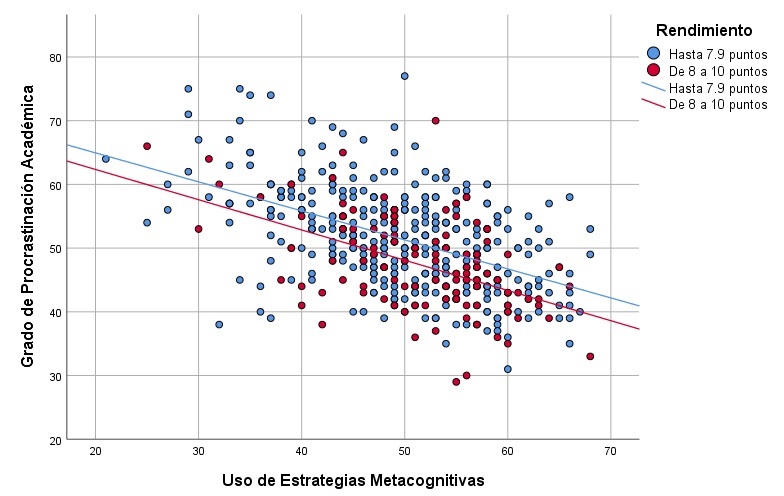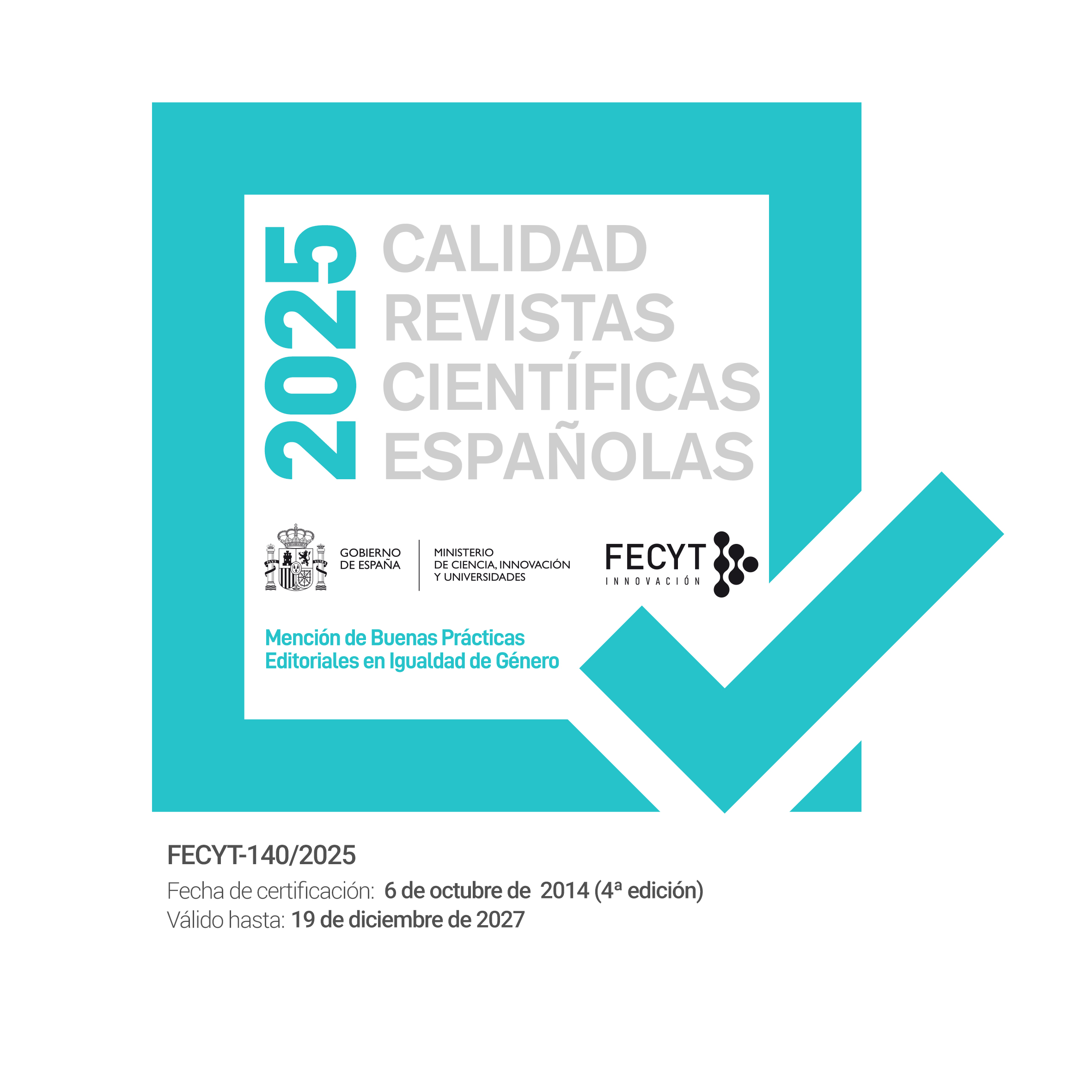La procrastinación en la formación inicial del profesorado: el rol de las estrategias de aprendizaje y el rendimiento académico
DOI:
https://doi.org/10.5944/educxx1.31553Palabras clave:
procrastinación académica, estrategias metacognitivas, estrategias socioafectivas, rendimiento académico, género, formación inicial del profesoradoResumen
Un alto porcentaje de alumnado universitario posterga sus actividades académicas, siendo causa de dificultades académicas y personales. El objetivo de este trabajo fue identificar y caracterizar la procrastinación académica, y su relación con el uso de estrategias de aprendizaje metacognitivas, estrategias socioafectivas, y con el rendimiento académico en estudiantes universitarios. La muestra estuvo formada por 794 estudiantes de grados y másteres de títulos de educación, que completaron la Escala de Procrastinación Académica (EPA), la Escala de Evaluación de Procrastinación para Estudiantes (PASS), y las escalas Estrategias Metacognitivas y Estrategias Socioafectivas de las escalas ACRA. Mediante análisis descriptivos, correlacionales, contraste de muestras, y de regresión lineal jerárquica, se constata que hay un alto porcentaje de estudiantes que procrastinan habitualmente, y que consideran que esta conducta les es perjudicial. Se produce una relación negativa entre la procrastinación académica con el rendimiento académico, y el uso de estrategias metacognitivas y socioafectivas. Las mujeres presentan menor grado de procrastinación académica que los varones, aunque consideran que es una conducta más perjudicial para sus actividades académicas. También difieren en una mayor atribución a la falta de empatía y baja autoconfianza por las mujeres, frente a la búsqueda de excitación por parte de los varones. No se encuentran diferencias entre cursos, edad o si realizan o no alguna actividad laboral. Las variables más predictoras de la conducta procrastinadora son el bajo uso de estrategias metacognitivas y la falta de energía y autocontrol. Se discuten las implicaciones de los resultados en actuaciones específicas para reducir la procrastinación en estudiantes universitarios.
Descargas
Citas
Abdi Zarrin, S., Gracia, E., & Paixão, M. P. (2020). Prediction of academic procrastination by fear of failure and self-regulation. Educational Sciences: Theory & Practice, 20(3), 34–43. https://doi.org/10.12738/jestp.2020.3.003
Balkis, M., & Duru, E. (2009). Prevalence of academic procrastination behavior among pre-service teachers, And its relationship with demographics and individual preferences. Journal of Theory and Practice in Education, 5(1), 18–32. http://eku.comu.edu.tr/index/5/1/mbalkis_eduru.pdf
Balkis, M., & Duru, E. (2017). Gender differences in the relationship between academic procrastination, satisfaction with academic life and academic performance. Electronic Journal of Research in Educational Psychology, 15(1), 105–125. http://doi.org/10.14204/ejrep.41.16042
Barnová, S., & Krásna, S. (2021). General procrastination and academic procrastination in pre-service teachers in the Slovak Republic. The Journal of International Education Science, 27(8), 1–11. https://doi.org/10.29228/INESJOURNAL.50845
Bäulke, L., Daumiller, M., & Dresel, M. (2021). The role of state and trait motivational regulation for procrastinatory behavior in academic contexts: Insights from two diary studies. Contemporary Educational Psychology, 65. https://doi.org/10.1016/j.cedpsych.2021.101951
Busko, D. A. (1998). Causes and consequences of perfectionism and procrastination: A structural equation model. [Tesis doctoral, University of Guelph]. https://hdl.handle.net/10214/20169
de la Fuente, J., Sander P., Garzón-Umerenkova, A., Vera-Martínez, M. M., Fadda S., & Gaetha, M. L. (2021). Self-regulation and regulatory teaching as determinants of academic behavioral confidence and procrastination in undergraduate students. Frontiers in Psychology, 12, 602904. https://doi.org/10.3389/fpsyg.2021.602904
Dunn, K., & Hayakawa, T. (2021). Destination irrational procrastination: An exploration of the role of attributional thinking and self-regulation on procrastination in synchronous online graduate studies. Online Learning, 25(2), 276–290. https://doi.org/10.24059/olj.v24i4.2205
Fernie, B. A., Kopar, U. Y., Fisher, P. L., & Spada, M. M. (2018). Further development and testing of the metacognitive model of procrastination: Self-reported academic performance. Journal of Affective Disorders, 240, 1–5. https://doi.org/10.1016/j.jad.2018.07.018
Franz, I. (2020). Unintentional procrastination, self control, and academic achievements. Education Economics, 28(5), 508-525. https://doi.org/10.1080/09645292.2020.1801596
Garzón-Umerenkova, A., & Gil, J. (2017). Propiedades psicométricas del TMBS en universidades. Revista Electrónica de Investigación Educativa, 19(4), 50–59. https://doi.org/10.24320/redie.2017.19.4.1340
Garzón-Umerenkova, A., Gil, J., & de la Fuente, J. (2020). Rasgos demográficos, académicos y personales asociados a tres tipos de procrastinación en el alumnado universitario. Bordón. Revista de Pedagogía, 72(1), 49–65. https://doi.org/10.13042/Bordon.2020.01.69513
Gil, J., De Besa, M. R., & Garzón-Umerenkova, A. (2020). ¿Por qué procrastina el alumnado universitario? Análisis de motivos y caracterización del alumnado con diferentes tipos de motivaciones. Revista de Investigación Educativa, 38, 183–200. http://doi.org/10.6018/rie.344781
Goroshit, M., & Hen, M. (2021). Academic procrastination and academic performance: Do learning disabilities matter? Current Psychology, 40, 2490–2498. https://doi.org/10.1007/s12144-019-00183-3
Hayat, A. A., Jahanian, M., Bazrafcan, L., & Shokrpour, N. (2020). Prevalence of academic procrastination among medical students and its relationship with their academic achievement, Shiraz E Medical Journal, 21(7), e96049, https://doi.org/10.5812/semj.96049
Hen, M., & Goroshit, M. (2020). The effects of decisional and academic procrastination on students’ feelings toward academic procrastination. Current Psychology, 39, 556–563. https://doi.org/10.1007/s12144-017-9777-3
Howell, A. J., & Watson, D. C. (2007). Procrastination: Associations with achievement goal orientation and learning strategies. Personality and Individual Differences, 43(1), 167–178. https://doi.org/10.1016/j.paid.2006.11.017
Kármen D., Kinga, S., Edit, M., Susana, F., Kinga, K. J., & Réka, J. (2015). Associations between academic performance, academic attitudes, and procrastination in a sample of undergraduate students attending different educational forms. Procedia - Social and Behavioral Sciences, 187, 45-49. https://doi.org/10.1016/j.sbspro.2015.03.009
Kim, K. R., & Seo, E. H. (2015). The relationship between procrastination and academic performance: A meta-analysis. Personality and Individual Differences, 82, 26–33. https://doi.org/10.1016/j.paid.2015.02.038
Kljajic, K., & Gaudreau, P. (2018). Does it matter if students procrastinate more in some courses than in others? A multilevel perspective on procrastination and academic achievement. Learning and Instruction, 58, 193–200. ttps://doi.org/10.1016/j.learninstruc.2018.06.005
Kurtovic, A. Vrdoljak, G., & Idzanovic, A. (2019). Predicting procrastination: The role of academic achievement, self-efficacy and perfectionism, International Journal of Educational Psychology, 8(1),1–26. https://doi.org/10.17583/ijep.2019.2993
Laybourn, S., Frenzel, A. C., & Fenzl, T. (2019) Teacher procrastination, emotions, and stress: A qualitative study. Frontiers in Psychology, 10, 2325. https://doi.org/10.3389/fpsyg.2019.02325
Limone, P., Sinatra, M., Ceglie, F., & Monacis, L. (2020). Examining procrastination among university students through the lens of the self-regulated learning model. Behavioral Sciences, 10(12), 184. http://doi.org/10.3390/bs10120184
Özer, Z., & Yetkin, R. (2018). Walking through different paths: Academic self-efficacy and academic procrastination behaviors of pre-service teachers. Journal of Language and Linguistic Studies, 14(2), 89-99. http://www.jlls.org/index.php/jlls/article/view/966/373
Pala, A., Akyıldız, M., & Bağcı, C. (2011). Academic procrastination behaviour of pre-service teachers’ of Celal Bayar University. Procedia - Social and Behavioral Sciences, 29, 1418-1425. https://doi.org/10.1016/j.sbspro.2011.11.381
Román, J., & Gallego, S. (1994). ACRA Escalas de Estrategias de Aprendizaje. TEA Ediciones.
Sæle, R. G., Dahl, T. I., Sørlie, T., & Friborg, O. (2017). Relationships between learning approach, procrastination and academic achievement amongst first-year university students. High Education, 74, 757–774. https://doi.org/10.1007/s10734-016-0075-z
Solomon, L. J., & Rothblum, E. D. (1984). Academic procrastination: Frequency and cognitive-behavioral correlates. Journal of Counseling Psychology, 31, 503–509. https://doi.org/10.1037/0022-0167.31.4.503
Steel, P. (2007). The nature of procrastination: a meta-analytic and theoretical review of quintessential self-regulatory failure. Psychological Bulletin, 133, 65–94. https://doi.org/10.1037/0033-2909.133.1.65
Steel, P., & Klingsieck, K. B. (2016). Academic procrastination: Psychological antecedents revisited. Australian Psychologist, 51(1), 36–46. https://doi.org/10.1111/ap.12173
Suárez-Perdomo, A., & Feliciano-García, L. (2020). Influencia del perfil de procrastinación activa en el rendimiento académico del alumnado de Ciencias de la Educación. Bordón, 72(3). 157–170. https://doi.org/10.13042/Bordon.2020.73642
Trujillo-Chumán, K., & Noé-Grijalva, M. (2020). La escala de Procrastinación académica-EPA: validez y confiabilidad en una muestra de estudiantes peruanos. Revista de Psicología y Educación, 15(1), 98-107. https://doi.org/10.23923/rpye2020.01.189
Visser, L. (2020). Academic Procrastination among First-year Student Teachers. Ridderprint BV.
Visser, L., Korthagen, F. A. J., & Schoonenboom, J. (2018). Differences in learning characteristics between students with high, average, and low levels of academic procrastination: students’ views on factors influencing their learning. Frontiers in Psychology, 9, 808. https://doi.org/10.3389/fpsyg.2018.00808
Wang, Y., Gao, H., Sun, C., Liu, J., & Fan, X. (2021). Academic procrastination in college students: The role of self-leadership. Personality and Individual Differences, 178. https://doi.org/10.1016/j.paid.2021.110866
Zhao, J., Meng, G., Sun, Y., Xu, Y., Geng, J., & Han, L. (2019). The relationship between self-control and procrastination based on the self-regulation theory perspective: the moderated mediation model. Current Psychology, 40(10), 5076-5086. https://doi.org/10.1007/s12144-019-00442-3

Descargas
Publicado
Cómo citar
Número
Sección
Licencia
Derechos de autor 2022 Luis J. Martín-Antón, Karina P. Aramayo-Ruiz, José L. Rodríguez-Sáez, María Consuelo Saiz-Manzanares

Esta obra está bajo una licencia internacional Creative Commons Atribución-NoComercial 4.0.
La revista Educación XX1 se publica bajo licencia Creative Commons Reconocimiento-NoComerciaL 4.0 (CC BY-NC 4.0). Se permite la generación de obras derivadas siempre que no se haga un uso comercial. Tampoco se puede utilizar la obra original con finalidades comerciales.










